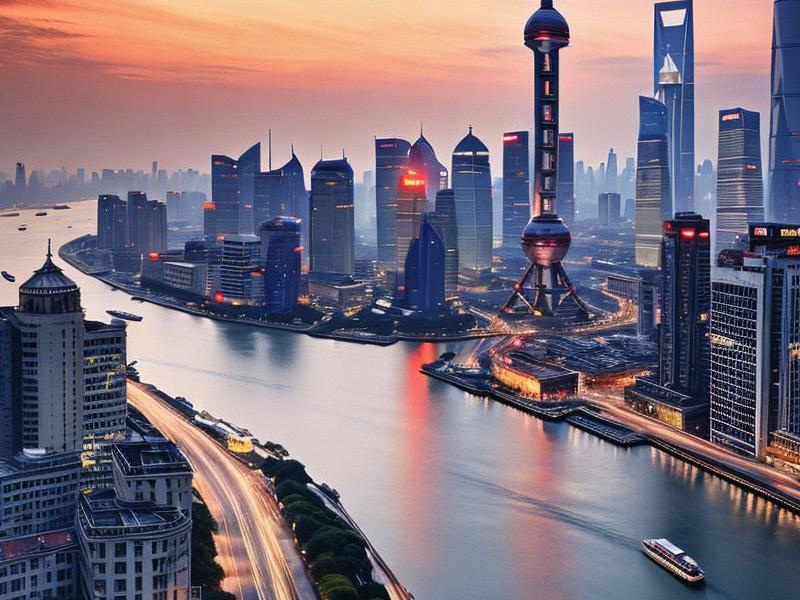
Shanghai's rise to prominence began in the 19th century when it was opened as a treaty port following the First Opium War. This marked the beginning of Shanghai's transformation from a small fishing village into a bustling metropolis. Over the decades, the city has undergone rapid urbanization and economic growth, emerging as one of the world's leading financial centers.
Today, Shanghai is home to over 24 million people and boasts a GDP that rivals that of many developed countries. Its skyline is dominated by iconic skyscrapers such as the Shanghai Tower, which stands at 632 meters and is the tallest building in China and the second-tallest in the world. These modern architectural marvels are a testament to Shanghai's economic prowess and its ability to adapt to the changing demands of the global economy.
However, Shanghai's story is not just one of economic growth and urban development. The city is also steeped in history and culture, with a rich heritage that dates back thousands of years. The Bund, a historic waterfront area along the Huangpu River, is a prime example of Shanghai's colonial past. Once home to numerous foreign concessions, the Bund is now a popular tourist destination, offering stunning views of the modern skyline across the river.
In addition to its historical landmarks, Shanghai is also known for its vibrant cultural scene. The city is home to numerous museums, art galleries, theaters, and music venues, which showcase the works of both local and international artists. The Shanghai Museum, for instance, is renowned for its extensive collection of Chinese art, including ancient ceramics, calligraphy, and paintings. Meanwhile, the Shanghai Grand Theatre hosts a wide range of performances, from classical music and opera to contemporary dance and theater productions.
上海龙凤论坛爱宝贝419 One of the most unique aspects of Shanghai's culture is its blend of traditional and modern elements. This can be seen in the city's cuisine, fashion, and lifestyle. Shanghai cuisine, known as "Hu Cai," is a delicacy that combines the flavors of Jiangsu and Zhejiang provinces with a unique twist. Dishes such as Xiaolongbao (soup dumplings), Shengjianbao (pan-fried buns), and Nanxiang Mantou (steamed buns) are must-tries for any visitor.
In terms of fashion, Shanghai has long been regarded as a trendsetter in China. The city's fashion scene is characterized by its eclectic mix of traditional Chinese clothing and international haute couture. The Shanghai Fashion Week, held twice a year, attracts designers, models, and fashion enthusiasts from around the world, showcasing the latest trends and innovations in the fashion industry.
Shanghai's lifestyle is equally diverse, reflecting the city's status as a global metropolis. The city boasts a wide range of shopping destinations, from luxury boutiques to bustling markets. Nanjing Road, one of the world's busiest shopping streets, offers everything from high-end designer brands to local handicrafts. Meanwhile, the French Concession, with its charming cobblestone streets and historic architecture, is a popular spot for boutique shopping and cafes.
In addition to its economic and cultural achievements, Shanghai has also made significant strides in urban development and sustainability. The city has invested heavily in public transportation infrastructure, including the world's first maglev train, which connects the Pudong International Airport to the city center. This efficient and environmentally friendly mode of transport has helped reduce traffic congestion and air pollution in the city.
上海龙凤419自荐 Shanghai is also a leader in green urban development. The city has implemented numerous initiatives to promote energy efficiency, renewable energy, and waste reduction. For example, the Shanghai Tower incorporates green technologies such as a double-skin facade and rainwater harvesting systems to reduce its environmental impact. Meanwhile, the city's urban planning efforts have focused on creating more green spaces and improving air quality, making Shanghai a more livable and sustainable city.
Despite its many achievements, Shanghai continues to face challenges in areas such as housing, education, and healthcare. The rapid growth of the city has led to increased demand for affordable housing, and the government has implemented various measures to address this issue. For instance, the city has introduced policies to encourage the construction of affordable housing units and to regulate the rental market.
In terms of education, Shanghai has made significant progress in improving access to quality education for all its residents. The city is home to some of the best universities and research institutions in China, attracting students and scholars from around the world. At the same time, the government has invested in vocational training programs to equip the workforce with the skills needed for the jobs of the future.
上海娱乐联盟 Healthcare is another area where Shanghai has made notable advancements. The city has a well-developed healthcare system, with numerous hospitals and clinics providing high-quality medical services. In recent years, the government has also focused on promoting public health initiatives, such as smoking cessation campaigns and mental health awareness programs.
Looking ahead, Shanghai's future looks bright as the city continues to grow and evolve. The Chinese government has identified Shanghai as a key player in the country's development strategy, with plans to further enhance the city's role as a global economic hub and cultural center. This includes initiatives to promote innovation and entrepreneurship, attract foreign investment, and strengthen international cooperation.
One of the most exciting developments in Shanghai's future is the construction of the Xiong'an New Area, a state-level new area located near Beijing. The Xiong'an New Area is expected to serve as a model for smart city development, incorporating advanced technologies such as artificial intelligence, big data, and the Internet of Things. This initiative is part of China's broader efforts to drive innovation and transform its economy.
In conclusion, Shanghai is a city that embodies the spirit of modernity and progress, while also preserving its rich cultural heritage. Its rapid economic growth, vibrant cultural scene, and commitment to sustainability make it a unique and dynamic destination. As Shanghai continues to grow and evolve, it will undoubtedly play an increasingly important role on the global stage, inspiring future generations with its endless charm and potential.
